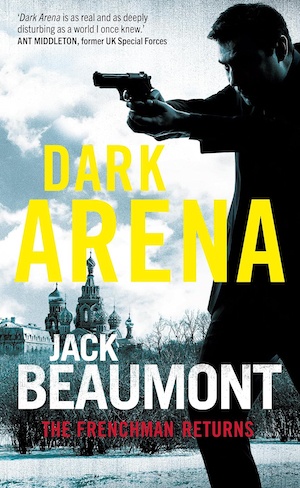
There seems to have been a spike in the number of ex-intelligence officers writing espionage novels recently – and they know what they’re talking about. Among them are David McCloskey and IS Berry in America, and James Wolff and Charles Beaumont in Britain. Dark Arena is slightly different, with former airforce pilot and DGSE officer Jack Beaumont, no relation to Charles, giving us a French take on the secret world of espionage. Referred to as ‘the company’ in the novel, DGSE stands for Direction générale de la Sécurité extérieure and is the foreign intelligence arm of the French security services.
The novel opens in Prague as case officer Paul Degarde takes every precaution for a meeting with his source, Lotus. It should be a routine hand over of intelligence and sure enough it goes like clockwork. Lotus is a former Georgian minster who is now a businessman trading in drugs, women, weapons and secrets to intelligence agencies, as long as the price is right.
Today’s haul for Degarde is four pages of highly classified Russian secrets. Among the documents is a reference to an upcoming meeting on the Azzam, a luxury yacht registered in the UAE. It must be big to justify this level of secrecy. Back in Paris, Degarde has time to hand the intel to his boss but is then taken out by a Russian team who invade his family home.
In DGSE Section Y – Operations – Alec de Payns is tasked with finding out who killed Degarde and who the agent of influence behind the Russian intelligence is. He has to figure out what the meeting on the Azzam is about and what significance it has for the West. The trail takes de Payns and his sidekick Lolo across Europe, as far as Baku and even to Israel and the Middle East. It’s a cat and mouse game with high stakes and international ramifications. Someone is drawing attention to the Russians and their plans – but it’s not just about them, this is about terrorism and secure energy supplies.
The novel is the second in The Frenchman series, following Beaumont’s debut of that title. It smacks of authenticity but that does slightly undermine the pace of the narrative, particularly at the beginning. We want a realistic feel to our spy fiction but the author is a little too taken by the tradecraft and it makes the opening a slow start. There are too many acronyms, most not important, but they may worry readers who come in thinking these things need to be remembered.
The positives of the novel do balance things out though. It’s a clever and involving plot that has a few surprises and twists along the way. The story is certainly in the moment and, without revealing too much, the plot features energy concerns and touches on the issues in Ukraine and the backdrop to the recent trouble in Israel and Gaza. Full marks for zeitgeist.
It also reveals a new kind of enemy spy. There are no Moscow Rules here; these Russians are as brutal and immoral as the terrorists, no fair play in sight. The incident with Degarde and his family early on is troubling. And family is another interesting aspect of the narrative. During the Cold War, espionage characters often didn’t seem to have private lives outside the service but Beaumont integrates de Payns’ personal story, his domestic arc, into the novel. That’s a positive aspect.
Dark Arena delivers on plot and the action is gritty and explosive. It’s a modern spy story of some force. We think de Payns has a way to go to make himself a go-to spy for readers of the genre but this is a good start. This is very interesting for having lesser seen – at least in Britain and America – French characters.
Dark Arena is not quite as good as David McCloskey’s Moscow X but it is a decent spy thriller. We’d be happy to see more of de Payns in the future.
If this kind of action/spy thriller strikes you as your thing perhaps try Tony Kent’s The Shadow Network, he’s a lawyer not a spy but he knows how to make a thriller incendiary.
Black Stone Publishing
Print
£13.85
CFL Rating: 3 Stars










Why are his novels so expensive? Are they not released in the UK?